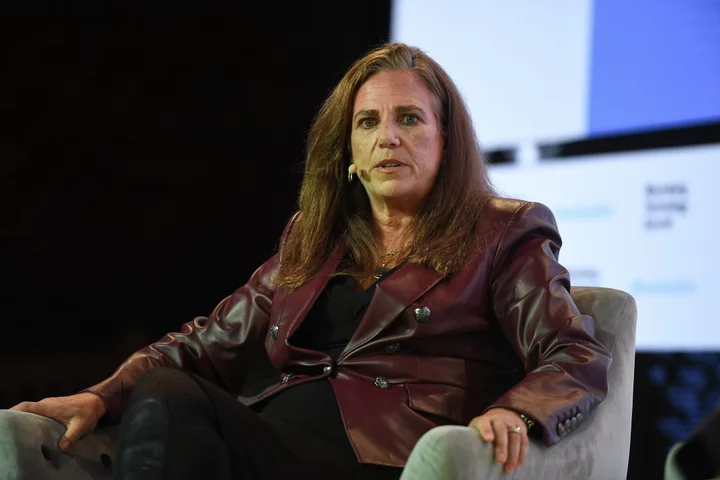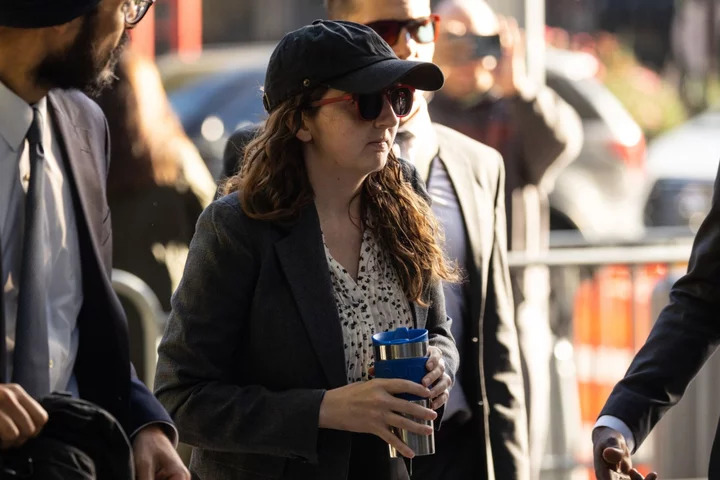Artists are starting to see AI as an “opportunity and not a threat,” according to Oleg Stavitsky, chief executive officer and co-founder of generative music startup Endel.
Endel has already partnered with Grimes, James Blake and Miguel, with artists becoming more open to AI projects, Stavitsky said during a panel at the Bloomberg Technology Summit in London.
Many artists are having their intellectual property stolen, according to Hilary Krane, chief legal officer at Creative Artists Agency, who joined Stavitsky on stage.
“Maybe you can create a better product if you can steal from other people,” she said. “We’re going to see competition in the models, if users can get their heads around demanding that what they use not be based on stolen goods.”
Bloomberg is hosting its annual European Technology Summit in London, focused on the world’s most pressing problems — from climate change to geopolitical tensions — and how tech companies are simultaneously trying to solve and survive them. Discussions are revolving around artificial intelligence, clean technology, the escalating race to dominate the chip industry and tech policy, among other things.
Watch LIVE here. All times are local in London.
Synthesia CEO Proposes a Blockchain to Detect Deepfakes (1:00 p.m.)
A digital fingerprinting process where videos and images are registered, similar to a blockchain, could help identify AI-generated content and deepfakes, Synthesia Chief Executive Officer Victor Riparbelli said.
“We should be able to figure out where this piece of content comes from, who did the original version, and has it been edited? This is a very difficult technical problem,” he said.
Riparbelli pointed to the music industry, which uses audio recognition tools to detect if songs infringe on copyrights. “With the right incentive structures we can get to a world where we can consume trusted content. And if we are watching something that isn’t verified, it’s obvious,” he said.
Machine Learning Is Not a Silver Bullet for Climate (12:10 p.m.)
Machine learning can have a major impact on how companies and governments handle climate change questions, but it is not a “silver bullet,” said Sims Witherspoon, climate and sustainability lead at Google DeepMind.
“It is a very powerful tool for a specific set of problems,” she added.
Witherspoon will feature in a new episode of Bloomberg’s AI IRL to air next month.
UK Is Set to Reject Big Tech Call for Antitrust Appeals Route (12:00 p.m.)
UK ministers are poised to reject Big Tech calls to be able to appeal against decisions made by the country’s antitrust regulator under new digital markets rules, people familiar with the matter told Bloomberg.
The government plans to use the new Digital Markets Unit within the regulator, the Competition and Market Authority, to apply extra scrutiny to companies such as Alphabet Inc. and Meta Platforms Inc., and to curb their dominance. A decision is expected within the next two months.
Will Hayter, senior director of the CMA’s Digital Markets Unit, is speaking at the summit this afternoon.
Musical Artists Are Warming to AI, Endel Founder Says (11:30 a.m.)
Musical artists are starting to embrace AI, according to Endel’s Stavitsky.
“Artists themselves are much more open to actually experimenting with this technology, because they see an opportunity rather than a threat,” he said.
Read More: Synthesia Sells Its AI Avatars to 47% of Fortune 100, CEO Says
Endel takes the original tracks of famous songs, known as “stems,” to create ambient tracks for relaxation or focus — a category Stavitsky said has exploded in popularity on streaming services such as Spotify Technology SA and YouTube.
He also announced a new deal Endel had signed with Rhino, a Warner Music label, to synthesize Roberta Flack’s song Killing Me Softly into three AI-generated soundscapes, which he demonstrated on stage.
European AI Startups Don’t Need Own Foundational Models (10:55 a.m.)
European startups should build applications rather than their own AI models to rival OpenAI, Google and Meta Platforms Inc., according to Rebeca Tristan, head of operations at business planning platform Pigment.
“I don’t believe there is a lot of value in focusing on building foundational models,” said Tristan. Pigment, based in France, relies on OpenAI for its own product.
Still, players in France and Germany have promising technology, said Ben Blume, partner at Atomico, pointing to Mistral and Aleph Alpha.
European companies can gain advantage by building products and services that comply with EU’s AI Act, a set of rules around the use of the technology, added Tristan.
AI Companies Should Race to Develop Safe Systems (10:30 a.m.)
Companies building artificial intelligence should “race” to develop “safe and ethical” systems on their own – because the tech will be much more powerful sooner than expected, according to Jared Kaplan, co-founder and chief science officer at Anthropic.
“We think AI is going to get much, much more capable very soon,” said Kaplan. “The risks become more serious.”
Anthropic, which is in talks to raise at a $30 billion valuation, says it develops “constitutional AI,” models like its service, Claude, built with safeguards to avoid bias, misinformation and other problems. It’s one of the companies invited to the UK government’s AI Safety Summit next week.
Kaplan said his startup was open to regulation, but argued that policymakers have few ways to constrain AI models given the pace of development. “The technology is moving so quickly that it’s very difficult to know what actions governments can take,” he said.
Siemens Chair Warns of China Cornering Battery Market (10 a.m.)
Europe needs to develop its own energy supply chain to prevent China from cornering the battery market, according to Siemens AG Chairman Jim Hagemann Snabe.
Snabe said the EU must avoid a repeat of the solar panel industry, where China undercut providers elsewhere by lowering prices. “We should not let that happen in batteries,” he said.
European companies have called for the continent to respond to the Inflation Reduction Act in the US, a bill that sparked billions of dollars of new investment.
Clean Tech Money Flowing Into Costlier Areas (9:45 a.m.)
Investing in clean tech has fallen from the flurry of activity a few years ago, but some leading figures in European clean tech see a revival around the corner.
Venture investors are beginning to put more money into more cost-intensive areas, such as water infrastructure and carbon capture, Raphaele Leyendecker, managing director at Techstars Sustainability Paris, said at the tech summit. “The interest is shifting from software to hardware,” she said.
Investors have poured money into nuclear fusion, one of the more expensive and unproven approaches to energy production. First Light Fusion’s Markus said companies like his can use artificial intelligence to bring about fusion energy more efficiently. He predicted that people could be charging their iPhones using nuclear power from the grid by the next decade.
Samir Abboud, CEO for geothermal heating company Innargi, said Europe has a more immediate need: “The big elephant in the room is actually heating,” he said. EU countries have spent an estimated €3.2 billion ($3.4 billion) on fossil fuels to heat homes and offices in 2022. Many countries have relied on natural gas from Russia. “That time is over now,” said Abboud.
Cyber Experts Say ‘You Can’t Secure Everything’ (8:55 a.m.)
Corporate executives need to accept the fact that they can’t protect every data point and focus on securing their most critical assets in the aftermath of high-profile cyberattacks, Cyberstarts general partner Emily Heath said.
In an interview at the tech summit, Heath said companies need to identify “the most important thing” to them, understand where it lives in their systems and then focus on protecting that. “You can’t secure everything,” she said. “Hone in on the things that matter.”
‘Nonhuman Identity’ Space Is Ripe for Disruption (8:50 a.m.)
If there is one space in cybersecurity that is “ripe for disruption,” it’s the area of “nonhuman identity” — a term used by the industry to describe digital and physical objects that interact with other systems such as devices and artificial intelligence tools, Cyberstarts general partner Emily Heath said at the tech summit.
“We’ve gotten really good at human identities — there are solutions out there for that,” Heath said. “The concept of nonhuman identity has exploded, but there is not as much disruption for nonhuman identities.”
Dominique Shelton Leipzig, privacy and cybersecurity partner at Mayer Brown, said one of the best things a chief executive officer can do to protect their assets is to speak publicly about it. “Just being visible” makes a company’s cybersecurity strategy 85% more successful, Shelton Leipzig said. “It sets the tone.”
Read More: The UK’s Best Hope for Tech Prowess Sits in Its Labs, Not Apps or AI









